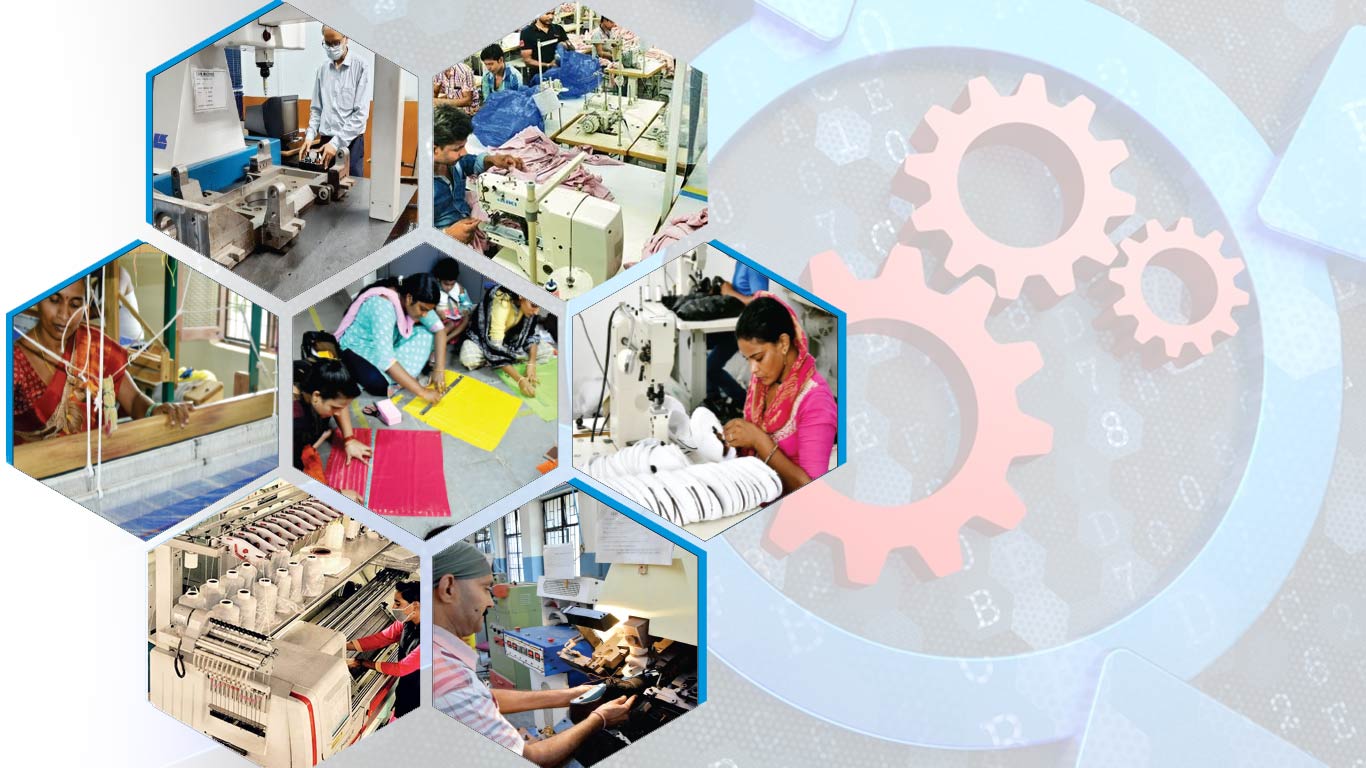10 Things that MSMEs need in this Budget
Updated: Jan 23, 2017 09:49:51am

10 Things that MSMEs need in this Budget
New Delhi, Jan 23 (KNN) In order to bring about meaningful economic and industrial growth, various industry representatives have given suggestions to FM Jaitley to boost the MSME sector, which is the backbone of the Indian economy.
The Federation of Indian Micro and Small & Medium Enterprises (FISME) had submitted a proposal for consideration for Union Budget 2017-18.
Let have a look at 10 immediately rectifiable issues and measures highlighted by industry body FISME:
1. Leveraging Import duties to support ‘Make in India’
Suggestion: Rates of Custom Duties on various stages of production - from raw material to finished products may be finely differentiated allowing small breathing space to each of the value adder. A study could be commissioned to identify potential sectors and slabs to encourage such. Value addition activities.
2. Access to Finance for the MSME manufacturing sector
MSME finance is treated by the banks and often by the Government as a homogenous issue. However, within the sector the challenges in finance for the MSME manufacturing sector are way different from other sub sectors like services or trade. In their operational flow MSME manufacturers need different kind of finance; viz., finance of difference duration for procurement of local, seasonal and imported raw materials and inputs, to provide security deposits and bank guarantee to buyers and finally provide forced or unforced suppliers’ credit to the buyers. The risk profile as well as cycle time for each of the above type of finance is quite different, however the Banks treat them within a single bucket of ‘working capital’ creating prohibitive cost of funds to the MSME manufacturers. If Government is really interested in promoting ‘Make in India’ in MSME sector, the access to finance for the MSME manufacturers need to be dealt separately.
Suggestion: For promotion of MSME manufacturing sector Government should encourage Banks and RBI to develop different financial products for the MSME manufacturing sector, viz., insurance products towards Bank Guarantees, discounting platform for secured receivables etc.
3. Operationalizing RBI TReDS platform for sale-purchase of MSME bills
To provide succour to fund starved MSMEs, setting up of an online platform for discounting of their supply bills as suggested by Kamath Committee may be expedited. To make it purposeful, it is necessary that the invoices are uploaded mandatorily and status of deemed acceptance is granted to them to convert them into negotiable financial instruments. This will not only provide much needed liquidity to MSMEs but will also usher in financial discipline in corporate and PSUs which is equally important for the country’s financial system.
Suggestion: Expediting the online platform and providing legislative backing to upload the invoices mandatory on buyers and grant status of deemed acceptance enabling them convert these into negotiable financial instruments.
4. Investment allowance on Capex
Section 80-I, investment allowance on capex was earlier allowed without any lower threshold. As tax benefit will accrue to the claimants only after each claim undergoes the scrutiny of the assessing officers, there should be no problem in administering the facility even in case of smaller capex. There is an urgent need to introduce tax breaks to promote employment generation on the same lines as depreciation encourages capital investment.
Suggestion: Section 80-I, investment allowance on capex should be without any lower threshold.
5. Incentive for employment
There can be no doubt that for a country teeming with Human Resources (looking for gainful employment), it is the bounden duty of the Government to encourage enterprises that encourage more employment for the same capital.
Suggestion: Any increase in social welfare and bonus expenses in a year, over the last year may be allowed as a 300% weighted deduction for the purpose of tax calculations.
6. Income Tax on Companies
Less than 3% of MSMEs are body corporates under Companies Act. Almost the entire MSME sector is composed of Proprietorship and Partnership firms. One of the major reasons of this peculiar phenomenon is absence of Income Tax slabs at lower rates for lower income Companies as is the case for individuals.
Suggestion: Income Tax for enterprises operating in the much desired (by the government) company format may be levied in slabs as available to individual tax payers.
7. Public Procurement
As mentioned earlier public procurement comprises almost 1/3 of India’s GDP. By having a direct control through buying on almost a third of goods and service produced in the country, Governments exercise enormous influence on the behaviour of economic actors of all hues. Utilities –water, electricity Boards etc, are among the largest buyers. Though these utilities are expected to run on commercial terms, their accounting systems and their inventory management systems are obsolete which allow a lot of unscrupulous practices to take place. While on the one hand, it results into enormous financial leakages, on the other hand such a devious system encourages inefficient firms and crowd-out efficient ones. This, many experts warn, in the long term lead to hollowing out of manufacturing in India as efficient firms may go out of business leaving the inefficient ones who also would not be able to withstand global competition.
Suggestion: Central funds/ assistance ought not to go the utilities/ agencies engaged in providing services commercially but not having:
a. double entry accounting system
b. 100% computerization of Inventory with IT based management systems.
8. Protective Measures for large manufacturers
For the last one year Government is imposing different protective measures like Anti- Dumping Duty, Safeguard Duty on import of base metals e.g. Steel to protect the market of domestic manufacturers’ from ‘cheap’ imports. While the intention of the Government may be to support the domestic industry to be viable, these measures are causing enormous damage to the user industries viz., engineering sector, by making their products uncompetitive in both domestic and export market due to high cost of the basic metals. EEPC has also raised these issues repeatedly to the Government without much avail. On the other hand more and more steel products are being brought to the purview of such protectionist measures. FISME has learnt from reliable sources that similar measures are being advocated by the domestic manufacturers of Aluminium and basic Chemicals also to insulate themselves from the dynamics of the global market. Again if imposed, these measures will cause irreparable damage to the domestic, down the line, manufacturers. This will also seriously affect the export performance of the MSME sector who export nearly half of the commodity export from India. Needless to mention, such a situation will further aggravate the drop in exports.
Suggestion: For the sake of the growth and competitiveness of the value adding, down the line industries, protective measures for all basic metals and chemicals should be taken judiciously, keeping in view their effects on the entire value chain. In any case Safeguard Duties should be immediately done away with from Steel imports. And Government should constitute a consultative machinery including the MSME sector, to capture the concerns of all stakeholders before imposing such protective measures.
9. Easing of Doing Business for MSMEs – simplification of procedures by the Ministry of Corporate Affairs
Ease of Doing Business is one of the focal initiatives of the present Government and towards this end Government is doing is best to simplify procedures. However, the Ministry of Corporate Affairs introduced a plethora of regulatory filings under the Companies Act, 2013 which make ‘Doing Business’ difficult for MSMEs. One such requirement is compulsory cost audits of all Companies, including private Companies, under which definition medium enterprises also often fall. While such filing may be essential to take care of monopolistic pricing by power discoms and other private monopolies, imposing them on private enterprises will only add further burden of compliance costs. Moreover neither the Government nor the consumers derive any benefit from such filing by enterprises who do not have any public shareholdings.
Suggestion: For ease of doing business, cost audit of private enterprises should be dispensed with immediately.
10. Towards ‘Making in India’, ensure availability of affordable workplace for MSMEs
Make in India is a timely initiative by the Government to boost the stagnant manufacturing sector. For manufacturing industry need workplace which is in real short supply today besides being formidably costly. If Government is really motivated towards upscaling manufacturing in India, it has to develop a work plan to make industrial sheds and modular factories available at affordable price. While the large sector can extract big plot of lands from the State Governments at zero or minimal costs, the MSMEs need to make market prices, which make the project unviable from the day one.
Suggestion: Government provides funding support to state governments under various schemes of different ministries for upscaling infrastructure. There should be caveats under such schemes to utilise a reasonable share of the grant to develop affordable worksheds and modular / flatted factories for MSMEs. (KNN Bureau)











